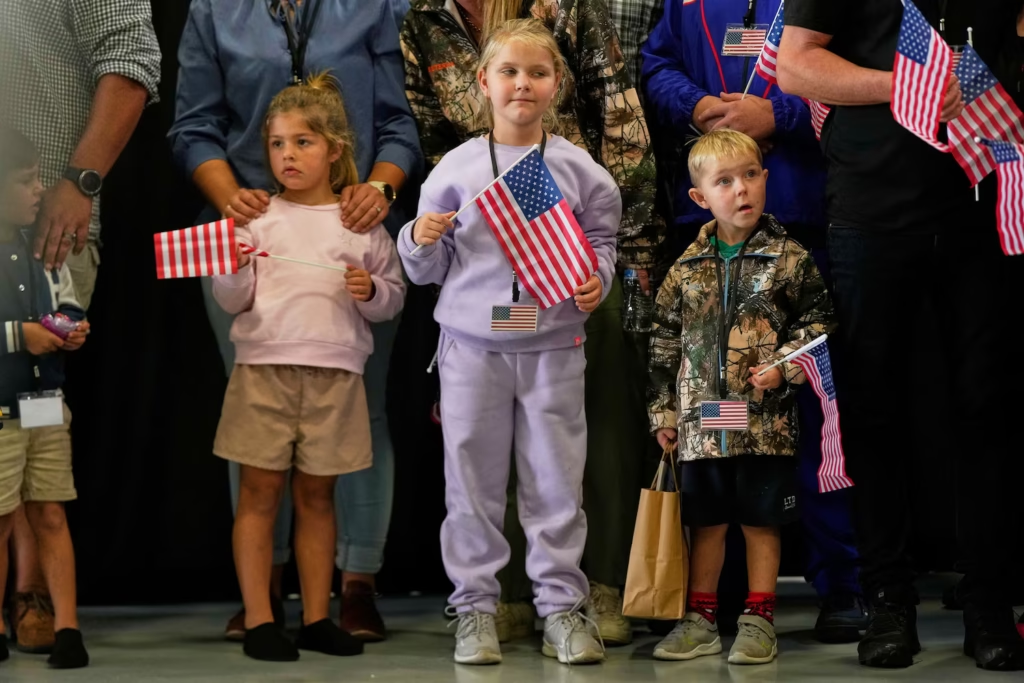On May 12, 2025, a flight carrying refugees from South Africa landed at Dulles International Airport, marking a significant moment in the ongoing debate surrounding U.S. immigration policy. The group of refugees, numbering in the dozens, consisted primarily of white South Africans, particularly from the Afrikaner community, a group the Trump administration claims has faced racial persecution in their home country. This marked the first wave of what is expected to be a larger migration of South Africans seeking refuge in the United States, a move that has prompted significant controversy and raised important questions about race, immigration, and the U.S. government’s stance on refugee programs.
The decision to expedite the asylum process for white South Africans, particularly those who are members of the Afrikaner community, has drawn sharp criticism from various sectors of the political spectrum. Critics have questioned the Trump administration’s prioritization of this group over other refugees from countries with arguably more pressing humanitarian crises. Proponents, however, defend the policy, arguing that the unique situation of white South Africans, particularly farmers facing violent crime, warrants special consideration.
The arrival of these refugees comes just days after President Donald Trump defended the decision in a public statement. Trump reiterated that the U.S. government’s stance is not racially motivated, despite concerns raised by critics. During a White House briefing, Trump stated that the refugees’ migration to the U.S. was a response to what his administration perceives as a “race-based genocide” occurring in South Africa, particularly targeting white farmers. The president said the issue was underreported by mainstream media and deserved more attention from the international community.
South Africa, however, has fiercely contested the allegations. The South African government has denied that white South Africans face systemic violence or discrimination, especially on the scale suggested by the Trump administration. A statement from South Africa’s government highlighted that while the country struggles with social and economic disparities stemming from its history of apartheid, the notion that white South Africans face genocide was unfounded and exaggerated. The government further emphasized that such claims ignored the country’s post-apartheid progress and the diversity of challenges facing all its citizens.
The debate over the treatment of white South Africans in their home country and the legitimacy of their refugee status in the U.S. is particularly complicated by the broader geopolitical dynamics at play. Critics argue that the Trump administration’s decision could exacerbate racial tensions, both within the U.S. and between the U.S. and South Africa. They also note that this move appears to be part of a broader pattern of preferential treatment for certain ethnic or national groups, with the U.S. government’s refugee policies coming under scrutiny for being inconsistent and politically charged.
Despite these concerns, the Trump administration has stood by its decision, framing it as part of a broader effort to protect human rights and provide refuge to those fleeing persecution. White House spokesperson Karoline Leavitt underscored that the refugees have been thoroughly vetted and are fleeing violence that has escalated over recent years in South Africa. She pointed to the government’s responsibility to ensure that it provides a safe haven to those who are genuinely at risk.
The White House has also pointed to the ongoing struggles of the U.S. refugee program, particularly the pause in refugee admissions from other countries. This has drawn ire from human rights organizations and Democrats, who argue that the U.S. is turning away refugees from war-torn regions like Afghanistan and Syria, while selectively opening its doors to a group they believe is not facing the same level of hardship.
The South African refugee crisis is rooted in the deeply rooted racial and social issues that have persisted since the end of apartheid in 1994. While the country has made strides in addressing systemic inequality, issues such as land reform, poverty, and access to resources have led to frustration, especially among historically disadvantaged communities. Violence against farmers, particularly those in rural areas, has been a significant concern, with some activists claiming that farmers, both black and white, have been disproportionately targeted in recent years. However, these claims have been difficult to substantiate, and experts caution against framing the issue as a systemic crisis for one particular racial group.
In contrast, other international organizations, including Human Rights Watch, have criticized the Trump administration for politicizing refugee issues and for ignoring the broader context of global refugee crises. By focusing on one group of refugees—especially a relatively economically privileged group like white South Africans—the U.S. risks undermining its commitment to humanitarian principles, critics argue.
The group of South African refugees that arrived in the U.S. on May 12, 2025, was greeted by Deputy Secretary of State Christopher Landau, who, alongside Homeland Security officials, offered a welcoming statement. Many of the refugees, including several children, were visibly emotional as they entered U.S. soil. The official welcome event included representatives from various U.S. government agencies, underscoring the significance of the occasion.
This event also coincides with rising tensions between the U.S. and South Africa, further complicated by the broader global political landscape. Trump’s relationship with South Africa’s leadership has been strained in recent months, especially after the Trump administration’s decision to remove the South African ambassador from the U.S. and freeze foreign aid to the country. These diplomatic actions were seen by some as a response to South Africa’s handling of land reform and its perceived hostility toward foreign investments in the country.
While many members of Congress have expressed concerns about the selective nature of the Trump administration’s refugee policy, others have praised the decision as a step toward ensuring that vulnerable individuals, regardless of race, are given the opportunity to escape violence and persecution. The issue has sparked fierce debate over the United States’ role in global humanitarian efforts, with proponents of immigration reform calling for a more inclusive and consistent policy that addresses the needs of all refugees, not just select groups based on national origin or race.
In the coming days, more details will likely emerge regarding the refugees’ status in the U.S., their integration process, and the long-term implications of the policy. Critics of the Trump administration’s refugee policies are closely monitoring the situation, while supporters are celebrating what they see as a victory for human rights.
For now, the arrival of the South African refugees serves as a reminder of the complexities of immigration policy, the balancing act between national security and humanitarian concerns, and the political dynamics that shape refugee decisions. Whether the U.S. will continue to prioritize certain groups over others remains to be seen, but for now, the focus remains on the well-being of the new arrivals and the questions surrounding their future in the United States.


